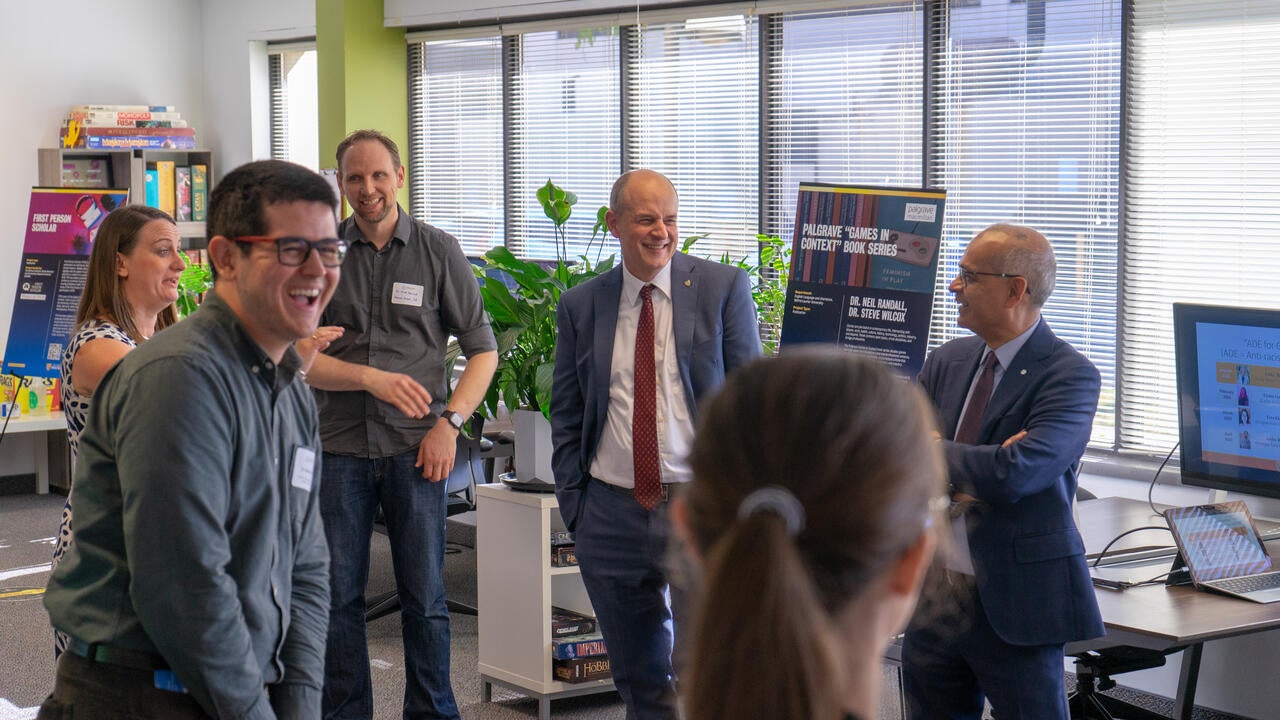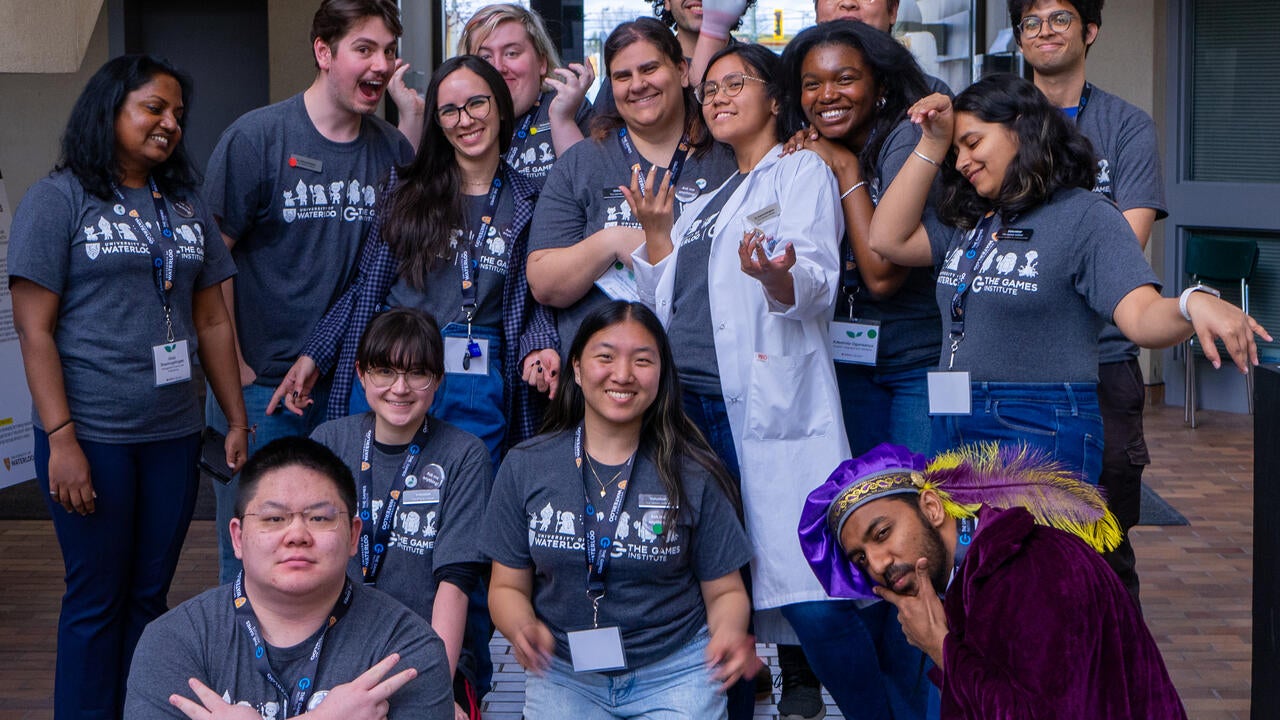
Cultivating inclusion through games and gaming
The Games Institute brings together a diverse community of artists, engineers, writers and scientists to collaborate on research projects

The Games Institute brings together a diverse community of artists, engineers, writers and scientists to collaborate on research projects
By Darren McAlmont University RelationsThere is no recipe or instruction manual for building inclusive spaces because they can never be constructed — they are cultivated. But if you ever speak to a member of the Games Institute (GI) at the University of Waterloo, they’ll share how they get to work and learn in an inclusive, judgment-free ecosystem.
That’s all because the GI organically attracts students and researchers from various backgrounds and academic disciplines to collaborate on immersive technologies and experiences. “We never had many requirements for membership; there were no fees or tests to get in,” says Dr. Neil Randall, executive director, at a recent GI symposium. “Instead of going out of our way to recruit members, we largely let them find us.”
And for more than a decade, the success of the GI has principally been because its culture of interdisciplinarity and spirit of inclusion.
“It doesn’t come from putting someone from humanities, social sciences and someone from STEM in a box and asking them to dance,” Randall shares. “For these ‘meetings of the mind to happen,’ people need to first feel comfortable and safe. They need to know that they will be treated as equals no matter their academic discipline, race, gender or sexuality. They need to know that they are allowed and even encouraged to think outside the box.”

Open house at the Games Institute

Dr. Dario Ho
Lecturer
Faculty of Arts
Dr. Daria Ho, a lecturer in the department of history and GI affiliated faculty member describes herself as an Asian-American transgender person, who is also a combination of a “bookworm” teacher-scholar, and a strategy and video game enthusiast, with a love for nature, travel and martial arts.
When Ho moved to Waterloo from the United States in Fall 2022, she wanted to find a way to interact with the broader University community but didn’t know how. As fate would have it, an email in her inbox announcing an open house at the GI would help her to find a home on campus. She and other members combine their interests in games and gaming with inquiries about identity and gender, and a range of other topics.
When asked to describe the community at the GI, Ho says, “It is congenial and delightfully eclectic; it is full of serious scholars who have fun, and fun-loving people who are ready and willing to ponder serious topics, all in a space that promotes open collaboration.”
Echoing this sentiment is Sid Heeg, a PhD candidate within the Faculty of Environment, who adds, “What I like about being a part of the GI is being among such a diverse community of artists, engineers, writers, and scientists and see how creative people can get with their research projects.”

Sid Heeg
PhD candidate
Faculty of Environment
At the forefront of transformative innovation is an interdisciplinary approach to unpacking complex problems. Waterloo supports unique ecosystems within our community that allow our researchers to thrive. That’s why the most common sentiment among GI members is the fact that they not only get to work and learn in an “unjudged, unranked, safe space,” but their research projects also benefit from interdisciplinary conversations and friendships they cultivate at the GI.
“When we conduct interdisciplinary research, we get to combine the tools of different research fields and this produces novel, fascinating work and knowledge that may not have been generated otherwise,” says Arden Song, a master’s student in the department of management science and engineering.

Arden Song
Master's Student
Faculty of Engineering
Song found her way to the GI via her current research supervisor Dr. Mark Hancock who offered her two co-op terms as a research assistant at the GI during her undergraduate degree program at Waterloo. “I grew to love the GI and its people, so I came back to do a master’s,” she says.
When asked to share how the interdisciplinary community at the GI shapes, informs and advances their research projects, Heeg says, “The intersections of my research focus on social media and misinformation about farming and food, and how that impacts farmers today … so with a background in the department of English, while now pursing an interdisciplinary degree in the social sciences, I’ve really appreciated seeing how people add this kind of artistic flair within research.”
“I've seen people learn to write more poetically and more artistically for their major research projects and PhD dissertations, so that's what I've always appreciated about the GI community … just how much fun they have with research,” they share.

Games Institute members and volunteers during recent Seed Symposium
Ho adds, “Diversity and inclusion aren’t simply words at the GI, they are the practiced culture. To have members from every faculty and multiple departments on campus engage each other formally and casually over coffee or tea, games, lectures and workshops, in ways that would not likely occur within traditional faculty structures … the Games Institutes truly is a treasure for the University.”

Read more
Here are the people and events behind some of this year’s most compelling Waterloo stories

Read more
Twenty-six researchers receive federal funding to drive discovery, innovation and research infrastructure development

Read more
The Government of Canada announces funding to support research in health, AI, climate and social equity and drive national innovation
The University of Waterloo acknowledges that much of our work takes place on the traditional territory of the Neutral, Anishinaabeg, and Haudenosaunee peoples. Our main campus is situated on the Haldimand Tract, the land granted to the Six Nations that includes six miles on each side of the Grand River. Our active work toward reconciliation takes place across our campuses through research, learning, teaching, and community building, and is co-ordinated within the Office of Indigenous Relations.